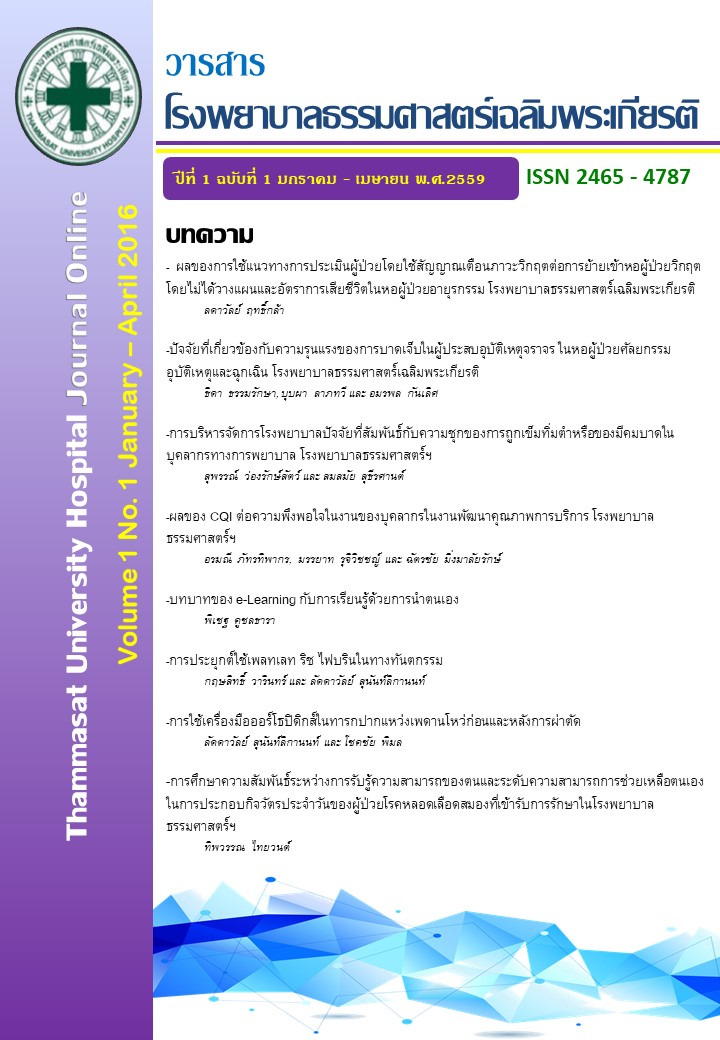The Result of the Continuous Quality Improvement Process on the Staff’s Work Satisfaction at the Service Quality Development Section, Thammasat University Hospital
Keywords:
Continuous quality improvement process, Work satisfactionAbstract
This research examined the difference of staff’s work satisfaction scores before and after the Continuous quality improvement process( CQI) implementation process, the learning about the CQI and the study of the staff’s perceptions towards work satisfaction after the CQI implementation process in the Service Quality Development Section(SQDS),Thammasat University Hospital(TUH),
This study was considered as a explanatory design research. The qualitative data was collected through a focus group to explore how the staff perceive about the CQI process and describe the self-satisfaction of the staff in their quality improvement efforts of working. The quantitative data was collected from the questionnaire to study effect of the CQI towards the staff’s work satisfaction. The participant group contained twelve people in the staff at the SQDS, TUH.
There were the difference of staff’s work satisfaction scores in specific aspects of working: knowledge management, key performance management, and all aspects of working before and after CQI. It was found that there was a statistically significant difference at p<0.05. There was not the difference of staff’s work satisfaction scores in specific aspects of working: quality management, risk management, and human resources development before and after CQI . It was found that there was a statistically significant difference at p>0.05.When analyzing the control chart on staff’s work satisfaction with the CQI process’s responses to the staff needs, there was showed that CQI increased staff’s work satisfaction with the CQI process’s responses to the staff needs after CQI. There was sufficient supported data as showed in qualitative study that the CQI process caused the staff’s work satisfaction. The key success factors for quality team consisted of 1) time and space for reflection 2) support the setting goals and timescales 3) sharing of ideas and 4) support from others, especially to try out actions. Benefits of CQI process included higher staff morale, more efficient processes, improved quality of services, and increased staff satisfaction. In conclusion, the CQI process affected major positive impact on the staff’s work satisfaction and the staff’s perceptions towards work satisfaction.
References
Anderson, D., & Ackerman-Anderson, L. (2001). Beyond change management: Advanced strategies for today’s transformational leaders. San Francisco: Jossey-Bass/Pleiffer.
Dale, H. B., Carol, B. -M., Glen, H. B., & Mary B. -S. (1995). Total Quality Management. New Jersey: Prentice-Hall, 77-85, . 151.
Deming, W. E. (1993). The new economics. Cambridge, MA: Massachusetts Institute of Technology, Center for Advanced Engineering Study.
Greenleaf, R. K. (2002). Servant leadership: A journey into the nature of legitimate power and greatness. Mahwah, NJ: Pualitst Press.
Hassen, P. (1993).Rx For Hospitals: New Hope for Medicare in the Nineties.Toronto: Stoddart Publishing.
Health Canada. (1993). Quest for Quality in Canadian Health Care: Continuous Quality Improvement. Canada: Minister of Supply and Services.
Juran, J. M. (1988). Juran’s quality control handbook (4th ed.). New York: McGraw-Hill.
Landry, M. B. (2013). The Effects of Life Satisfaction and Job Satisfaction on Reference Librarians and Their Work. Academic journal article from Reference & User Services Quarterly, 40(2).
Richard, A. A. (2010). Continuous Quality Improvement, Total Quality Management, and Leadership (Doctoral dissertation, Capella University).
Vroman, H. W., & Vincent P. L. (1994). Managing organization Quality. Boston, Massachusetts: IRWIN,: 188-189, 332-333.
Van de Ven. A. & Poole, M. 1995. Explaining development and change in organizations. Academy of Management Review, 20(3) : 510-540.



